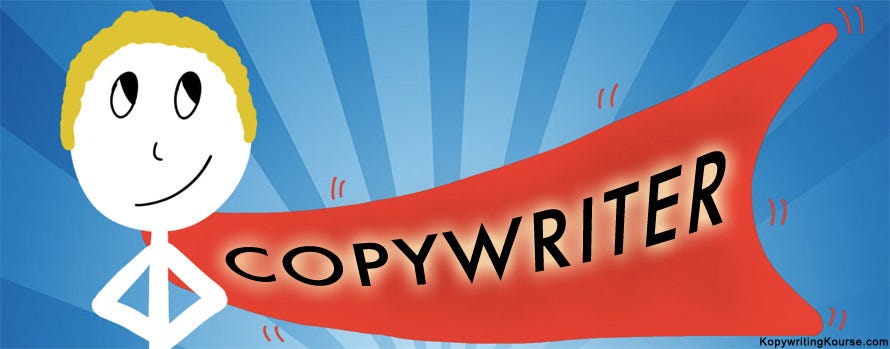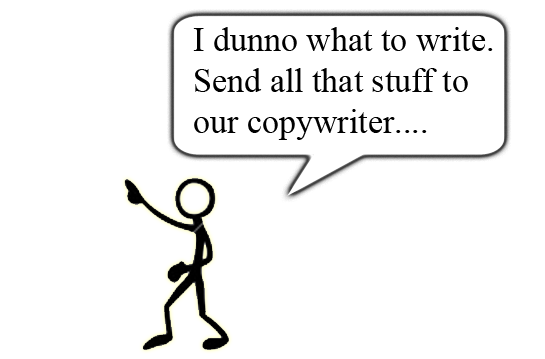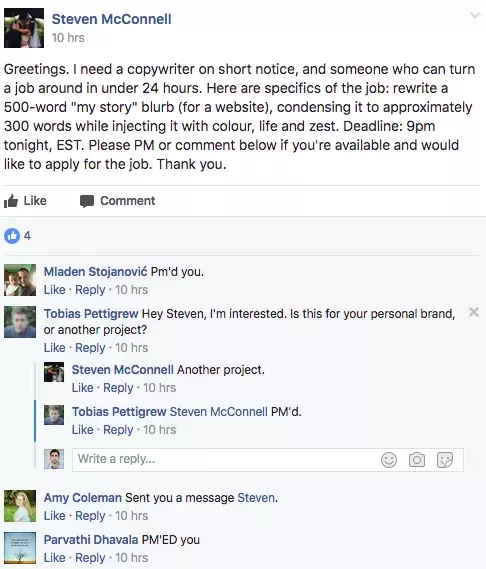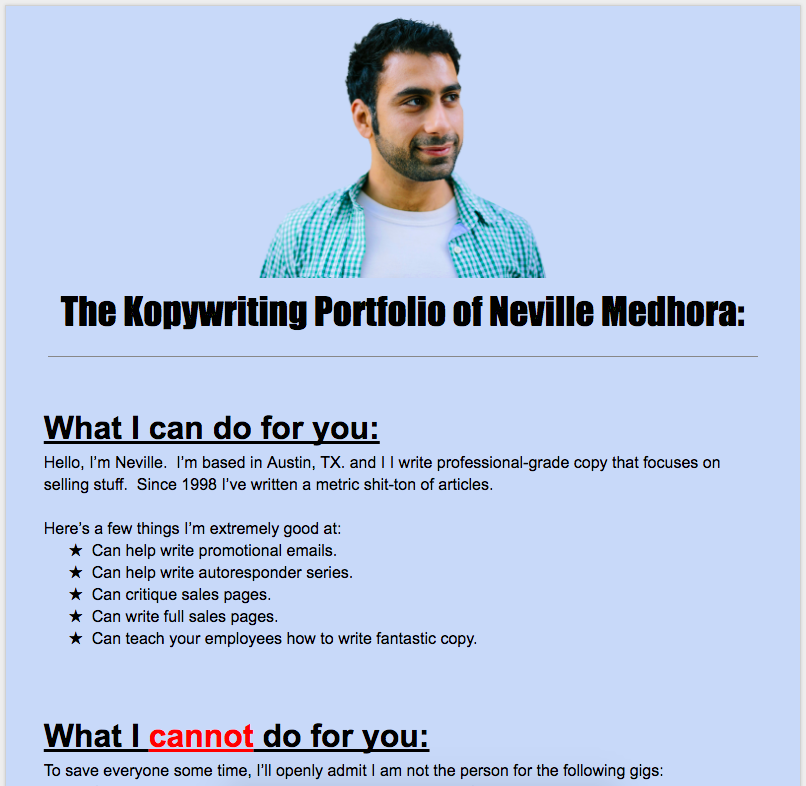How To Become A Copywriter
*In the comments I will answer any questions you may have about getting started as a copywriter.

SO, you wanna learn how to become a copywriter eh? Well it’s very possible. In fact, there’s really no formal education you need. Some of the top-paid copywriters in the world never went to college or took a writing class!
No education!
No formal training!!
Sounds great already!
…..now before you start getting crazy, let’s go through the steps of going from nothing, to freelance copywriter:
STEP 1.) You gotta know WHAT copywriting is at the core:
Copywriting is essentially moving words around to sell better.
Let’s say I work for a company that has a webpage which gets 1 out of 500 visitors to buy something.
If I was a copywriter, I would figure out how to make 1 out of 100 of those people buy. This means 5x more sales from the SAME webpage!
A good copywriter will understand how to do this with their words, and also how to re-arrange pictures and buttons to get more sales.
A good copywriter is not just a writer. They are a keen studier of the human psychology behind purchase decisions!
STEP 2.) Understand WHY people hire copywriters:
Think of the huge amount of content a lot of companies have to put out.
A single insurance company will have to put out all this stuff:
- Ads on TV
- Ads on the internet
- Ads on radio
- Brochures for B2C sales
- Brochures for B2B sales
- Brochures for every different product
- Forms to fill out
- Forms to fill out for various different product lines
- Google ads
- Facebook ads
- Update their Twitter
- Update their Facebook page
- Make content for their website
- Make the content for their website about each different product
- Make sure their content is converting
- Make sure customers understand how to signup
- Send customers packets explaining their policy
- Have scripts for their sales people to follow
- Have scripts for their customer support people to follow
- Write press releases
- The list goes on and on and on and on…

Allllll of these things need to get written by or looked over by a copywriter. And that’s just a single example!
Some companies will rely heavily on copywriters. Some companies (like 37Signals) require ALL members of the team to be great writers before they ever start.
So people will pay a copywriter good money to handle these things for them. But YOU my young friend, need to understand that to get that money, you need to keep relationships within those companies that need those services.
Step 3.) Learning to Get Clients As a Freelance Copywriter:
This is by far the biggest question I get. And people seem to forget one thing:
Establishing yourself as a freelance copywriter is the same as building a business from the ground up.
You’ve got to put in LOTS of effort in the beginning, show talent, and not expect immediate riches. There’s no free lunches here boys and girls.
A lot of people get entranced by the prospect of working from their laptop from anywhere in the world as copywriter. In fact people go nuts when I post pictures like this from various locations!

Since all my copywriting business is conducted from a laptop, I can take off and go work from the beach.
Or if I wanted to drum up an extra $10,000 really quick …..I can just devote some of my hours to copywriting gigs.
But these luxuries are the result of hard work, actual results, and existing exposure.
This won’t happen overnight for most copywriters. And probably NEVER will for a lot of them.
However I’ll share some of the ways I’ve personally seen people get amazing (and high paid) copywriting gigs (5 tips):
Getting Clients #1.) Becoming popular for doing something OTHER than copywriting
If you become known as a famous figure in any field, you have a better chance of gaining credibility.
And if you have high credibility, you can ask for more money.
So how did I build credibility for my copywriting career?
I originally ran a couple of businesses starting from high school, and I first applied some copywriting techniques to the email list I had.
I was involved in a whole bunch of companies:
— NevBlog
— HouseOfRave
— AppSumo
— Sumo
— HustleCon
— TheHustle
…..and I’d done work with a bunch of other companies by this point too, which eventually led me to start https://CopywritingCourse.com.
I always thought my buddy noah kagan would be a great copywriter because of his vast business experience. No matter how he writes, it’s always interesting because he’s been-there-done-that.
Doing things OUTSIDE of the marketing and copywriting field gave me great credibility, because I knew what I was doing more than copywriters who’ve only just done…..copywriting.
Getting Clients #2.) Becoming popular in a specific niche
So a lot of lower-end copywriters will insist “I can write everything!” But in reality they should niche down when they start. For example, if you worked for a big health company and did a lot of writing for them, you should call yourself a copywriter that specializes in the health space.
This will make it easier to gain credibility in a specific area.
You probably wouldn’t super-trust the guy who mows your lawn for financial advice…..however you REALLY might take his advice on how to hedge bushes and get a clean line on the edge of a lawn.
He has very specific advice, and lots of experience practicing what he’s talking about.
Instead of being “just a copywriter” ….it would be better if you were “A female copywriter who specializes in talking to 1st time expecting mothers.”
It would be best to hang out and network in places where people are selling stuff to 1st time expectant mothers. If someone need a copywriter, and you have experience in EXACTLY their niche…..guess who has a high chance of getting the gig??
My personal niche started out with smaller companies and daily deals. Then moved into medium sized businesses.
However if someone approached me to write for 1st time expectant mothers, I could DO It……but I don’t have experience and can’t exactly relate to the struggles of that demographic. So I try to stick to my area of expertise so I can deliver the maximum results.
Getting Clients #3.) Becoming popular for big companies
THIS method can apply to certain people, and be quite lucrative.
Let’s say you worked for a big company in the marketing department and you were exposed to how a big marketing department tests & releases products.
If you were to build a nice little network in the same industry, and then become a consultant with a VERY SPECIFIC expertise, then you get some other big companies to fork over A LOT of money.
Smaller freelance gigs can pay a few hundred dollars. But a huge corporation who is a doing an 8+ month rollout of $100,000,000+ product will pay you some phat-ass cash to ensure they do it right.
Now I personally probably couldn’t get one of these gigs because I’ve never worked inside a huge company. That means I lose major credibility because I’ve never walked the walk.
But if you do have some very niche experience within a big corporation and had a few big wins, you might be able to become a very highly-sought-after consultant.
The cool part is you only need a few good contacts for this.
I know someone who wrote an oil-management program in the 70’s that’s still used today. Till this day he gets sweet-ass gigs from multiple companies JUST to be around if anyone needs help implementing it.
Since the projects he consults for are $2billion+ …..the companies don’t mind shelling out major cash just to keep him around.
Boring? Yes :-(
Sweet cash flow? Yes :-)
This is one of the benefits of working with a big company:
You know how to implement projects within a large company. That is actually a rare skill.
Getting Clients #4.) Get small-time gigs.
Now there are some other ways to get copywriting gigs, but I’ve never seen anyone who consistently made big money doing these things alone, so I’ll just list them quickly:
- Posting on Fiverr for copywriting gigs.
You’ll definitely get some leads this way, but your clients will usually be bargain-hunters and not HUGE jobs. - Posting on Craigslist as a copywriter for hire.
This will generally result in corporate copywriter jobs that are relatively low-paying ($35,000 — $45,000). - Posting on UpWork as a copywriter for hire.
This will get you small to medium gigs. It’s not my favorite way of getting business, but it can get the ball rolling.
The next step is my favorite:
Getting Clients #5.) Post in Facebook Groups where people can use copywriting services.
I think this one because it’s the easiest and most effective. Just go to groups like The Cult of Copy Job Board that you are offering your services for a one-time low price of $xxxxx and that you’re for hire.
A lot of times people will bite.
People also constantly post gigs there such as:

Not all the gigs will be good, but some will.
In the beginning you will have to scrape together gigs, but if you start putting all your work inside a simple portfolio, you can gain some steam. Which brings me to our last step in becoming a copywriter:
Step #4.) Make a Simple Copywriting Portfolio!
Ok, listen to me carefully young buck:
You DO NOT NEED a fancy website. In fact, I’ve never never ever seen someone get a copywriting gig directly from their portfolio. EVER!!
The reason is: people are looking to hire you based on your skills at copywriting. Not “how fancy your website looks.” This is a common mistake.
Look how crappy my copywriting consults page is. That page generates huge returns even though it sucks super bad. The desire to buy is created from previous exposure to me, NOT the way the page looks.
People will spend months and lots of money and time on a fancy website, only to realize NO ONE IS COMING TO IT. The only people going there are the people they meet directly and tell to go there.
The best type of copywriting portfolio is a simple page with the following elements:
- Your name.
- Your expertise (Social Media? Landing Pages? A/B Testing?).
- A few examples of your work.
- How they can book a session with you.
You can even make it in a free Google Doc like this:

See how simple that is?
It also only leaves them ONE option of what to do next, and that’s to book a session with you.
These sessions should generally be a minimum of $100.
If a client is not willing to pay at least $100 for a consultation session where you point out everything wrong with their page, they are NOT going to buy anyways.
My minimum consultation session is $597 now. And I’ve learned the hard way that if people are not willing to pay it, they are not going to be willing to pay you more (or they just simply can’t afford it).
Oddly enough, the more I charge for each hour session, the more respect and compliance I get from the client! They want to make SURE they get their money out of that session , so they ensure they show up on time and show up prepared.
I would personally avoid doing free sessions. Because what generally happens is:
1.) Everyone gets excited about working together.
2.) You setup a meeting with this “prospective client”.
3.) You prepare for the meeting and draw up a proposal.
4.) You talk with the client and tell them what you’re going to do for them.
5.) They tell you “let’s talk again soon after I run this by my boss.”
6.) You never talk again…..and all that time was wasted.
7.) You become sad and poor :-(
To get people taking you seriously, you need to charge them for your time. If they decide to go for a full contract with you, then you can comp them the hour long session. However if they don’t go with you, at least you still get paid.
Charging people for your time is a sure-fire way to get them to value your services.
Every single successful freelance copywriter I know ALWAYS charges for their time.
Step #5.) Some Copywriting Books for you to read:
I’ve read a helluva lot of copywriting books, and these are the one’s I recommend you read to get off to a great start:
BOOK 1.) Read The Gary Halbert Letters (Free) Start by reading “The Boron Letters”. Make sure you print each chapter out for maximum effect!
Ch 1, 2, 3, 4, 5, 6, 7, 8, 9, 10, 11, 12, 13, 14, 15, 16, 17, 18, 19, 20, 21, 22, 23, 24, 25
You can also buy The Boron Letters directly from Amazon.
BOOK 2.) If you want a book that sits on your desk and can re-cap this kourse quickly, then grab my book called “This Book Will Teach You How To Write Better” from Amazon.
BOOK 3.) Read Advertising Secrets of the Written Word by Joseph Sugarman. This book usually costs in the $30 range, but is one of my go-to books for ideas on how to position copy. Almost every successful copywriter will know this book.
BOOK 4.) Also, check out Ogilvy on Advertising by David Ogilvy (great for traditional advertising advice as well)
Your Next Steps To Becoming A Copywriter:
I showed above in this post some good things to do first:
- Read the copywriting books I recommended above.
- Making a simple copywriting portfolio.
- Put yourself out there.
Copywriting is the bread, butter, meat, and potatoes of our work as a digital marketing agency. So to make sure everyone can join the feast, it’s time to demystify the process.
In this post, we’re talking you through what it’s like working with a copywriting agency, and why you need to bag yourself a copywriter in the first place.
What does a digital agency do?
Not everyone fully gets the agency model or the value it adds, which is fine. Personally, I don’t get the difference between a Rothenberger and a Bernzomatic brazing torch; I trust the plumber to know what he’s talking about and lo, my bathroom hasn’t flooded yet.
So, as a digital agency we work with anyone, on any size or shape of project. We do a lot of one-off jobs like video production or upskilling in-house marketing teams in using social media. Sometimes, clients have us on retainer to support them with strategy and ongoing content production.
Think of us as your go-to people for skills you might not need in house 24/7 but when you do need them, you need to get them right. Like the A-Team… or possibly the Dukes of Hazzard depending on budget.
What is copywriting in digital marketing?
A copywriter is one who writes the copy; the words which appear as part of your marketing. Blogs, social media posts, whitepapers, even your website itself. If it’s written down, you need a copywriter.
The name leads to all sorts of interesting conversations at networking events. I sometimes get ten minutes into talking about something before realising the other person thinks I’m a lawyer. Awks.
So no, copywriting is nothing to do with copyright, which is a legal term. It’s also nothing to do with plagiarism or ‘copying’ other people’s work.
It’s all about words. Copywriters in ad agencies, for example, might come up with slogans and taglines, or write the text for big brand campaigns across multiple platforms.
Why do you even need a copywriter?
Using a digital copywriting agency means you’re working with specialists who look at your business like your customers do. We accentuate the benefits that appeal to your target audience, writing about them in a way that captures their attention and interest.
There’s a common misconception that as a business owner, you’re the best person to write the copy because you know the product like the back of your hand. But when’s the last time you took a fresh look at the back of your hand and got excited about it?
In some, I’d even argue most cases, the client is the worst possible candidate to write effective sales-focused copy. You might make too many assumptions about the reader’s familiarity with your product, because you live and breathe it yourself. Or you might get the urge to cram in too much irrelevant background knowledge gleaned from years in the lab; you care, your customers don’t.
But how do you find a good copywriter?
Short answer: use us.
Long answer: go with whoever asks the most questions. There’s a lot of arrogance in agencies; designers sneering at the choice of colour palette or strategists thinking they know better than the client about the people they’re trying to reach.
Sure, a good copywriter can articulate your sales proposition better than a layman, but we need to pick your brains first. We always kick off any project with lots of questions:
What are your business objectives?
What are your challenges?
Who are you trying to reach, and where do they hang out online?
What’s the scope of the copywriting project, and who has final sign-off?
Good copywriters listen. We want to hear stories about the business that we can weave into copy, the things that make you distinct from the competition. Most importantly, a good copywriter will ask how you explain your product or service in your own words. It’s often very different to what’s on the website.
What’s the workflow for a copywriting project?
Every job is different, because every objective we need to meet is different. That said, we do like having clear processes in place to streamline things as much as possible. A typical job might look like this:
Ideally, we’ll come meet you at your offices, studio, branch, coffee shop, swimming pool, or secret volcano lair. That helps us get a feel for the wider context of your business’ culture
You put together a clear brief telling us everything we need to know about the project (more on that in a sec)
We’ll put together a proposal for you to review
Once we get the green light, we’ll explain the timelines and get started
Kick-off meeting to discuss the specifics and finalise the site map and clarify the content
First draft sent over for you to review
Edits made
Final draft
Copy enters circulation, business booms
Real life is rarely so neat and tidy, but what is digital agency experience good for if not the ability to think on our toes.
How do you write a copywriting brief?
A copywriting brief covers relevant info on both your organisation and the task at hand. What you do, where you’re based, and whether you have any existing tone of voice or style guidance is a great start. Then we can get into the nitty gritty of your project; its goal, audience, and key messages to send.
The importance of a clear written brief is impossible to overstate. It clears up any ambiguity, allows you to get all your thoughts out, and gives us as much context as possible in one place. One good solid brief beats a million disjointed notes and emails.
We love asking questions so much we created a simple copywriting brief template that we ask clients to fill in.
How does an agency quote for a copywriting project?
We’re nice and transparent about how we quote. The precise scope of work will be decided as part of our proposal, and the budget signed off before the project begins. This keeps everyone on the same page and manages expectations.
It’s also vital to be fully upfront about who’s involved. The value added by a copywriter, a designer, and a developer is as different as you get from a carpenter, a plumber, and a bricklayer. We’re careful to get to the bottom of what skills your project calls for to ensure no surprises mid-way.
Choosing the right digital marketing agency
In a sense, you’re spoiled for choice. There are a lot of good copywriters out there, your headache lies in choosing the right copywriter for your project. Many specialise in different sectors or in different types of job. Be sure to look at case studies to see examples of similar work. Ask if they have experience in your sector, at Sookio we love working in:
Get the marketing your brand deserves
When you commission a copywriter you’re buying ideas, clarity, and the science of persuasion. Be sure to take your time and come to a fully reasoned decision on who to trust to be the voice of your brand.





Comments
Post a Comment